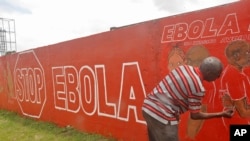Regional health ministers from the Economic Community of West African States [ECOWAS] will evaluate the implementation of strategic plans aimed at combating Ebola at a meeting in Ghana’s capital, Accra, this weekend, according to Haruna Warkani, acting ECOWAS communications director.
He said the regional group is working closely with member countries battling the disease including Guinea, Liberia, Sierra Leone, and Nigeria, as well as its international health partners.
Warkani said the regional health ministers, who recently met in Accra, outlined strategic plans to contain and subsequently eradicate the disease.
“Another meeting is scheduled in Accra as a follow up… which would include West African health institutions… [and] other international development institutions like the World Health Organization and the United Nations. [They] have been very much involved in looking for [a] common solution to [Ebola],” said Warkani.
The World Health Organization reports the current Ebola virus outbreak in West Africa is 6,263 confirmed cases with 2,917 deaths.
Critics have accused ECOWAS of reacting too slowly since the first cases were reported in Guinea.
Warkani disagreed, saying the regional bloc has been performing its functions as a coordinating body. He said ECOWAS has been helping member states in that capacity, and also working to create international attention about the challenges member states face in fighting the outbreak.
“These criticisms are surely unfounded, because it is a disease that suddenly came up upon the populations of the sub-region. So to say ECOWAS has not done anything, it will be difficult to justify that kind of position,” said Warkani. “ECOWAS has successfully rally round [the] international community to understand what is going on and seek for help anywhere because it is beyond the sub-region to contain this scourge.”
He said ECOWAS has to be praised for its work to help contain the disease.
“The sub-region needs to be commended even for the containment effort so far recorded, because except for one or two [countries], the spread is definitely almost under control today, and this is as a result of the interest generated at the international scene,” said Warkani.





